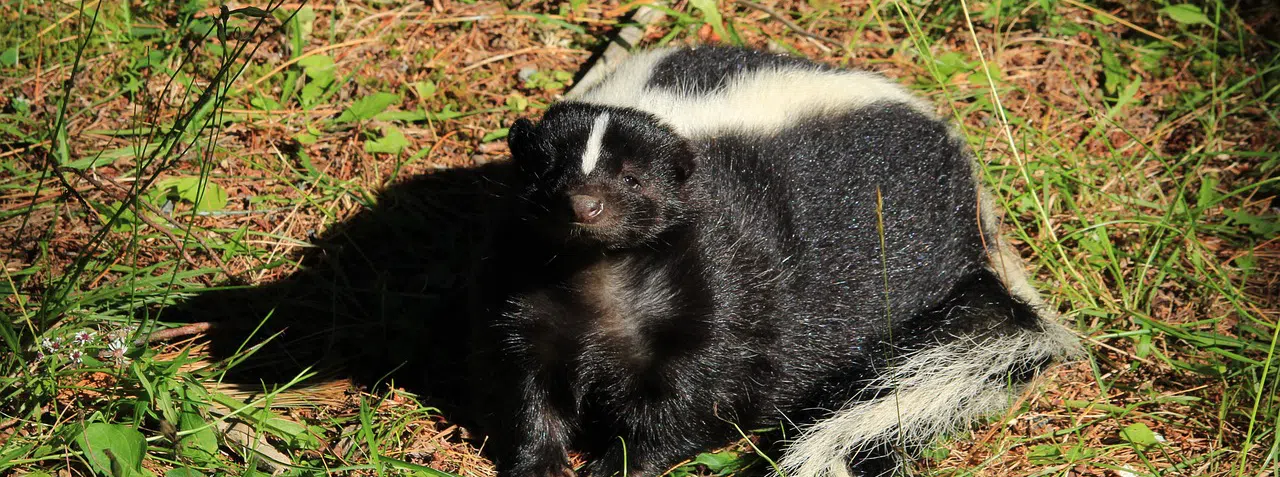Whether you're a seasoned wildlife watcher or just looking out for your furry friends, understanding the ins and outs of rabies and its potential carriers, like skunks, is crucial for keeping yourself and your pets safe.
It’s important to note that humans who exhibit symptoms of rabies have no options for cure or treatment. By the time symptoms appear, it is too late. If you suspect you may have been in contact with a rabid animal, it’s time for a trip to the Emergency department for one or more vaccine injections (depending on whether or not you’ve had a rabies vaccine in the past). STAT.

Here’s how to tell if a skunk has rabies, practical safety measures to prevent exposure, and what to do if you encounter potential rabies in skunks.
Understanding Rabies
What is Rabies?
Rabies a serious viral disease that messes with your nervous system. Rabies is usually spread through the bite of an infected animal, and if you don’t get treatment as soon as possible, it could lead to death.
>How is Rabies Transmitted?
Rabies is primarily transmitted through the saliva of an infected animal, typically entering the body through a bite, scratch or by ingesting contaminated water.
The virus can also potentially infect someone through open wounds, abrasions, or mucous membranes (like the eyes, nose, or mouth) if they come into direct contact with the saliva of an infected animal.
Of course, you’ll want to avoid contact with any wild animal in general, but it’s especially important to avoid contact with the saliva, blood, or tissues of a potentially rabid animal to prevent transmission.
Identifying a Skunk with Rabies: Common Symptoms
So, where do skunks come into play? Can skunks get rabies? And how can you know how to tell if a skunk has rabies?
Aggression
Rabid skunks can get seriously aggressive, causing unprovoked attacks or defensive posturing like they're ready to throw down at any moment. That’s why we say one of the first, most obvious signs of how to tell if a skunk has rabies is straight-up aggression.
A big thing to note is that this aggression can escalate really quickly. If you spot a skunk acting feisty, it's best to keep your distance and play it safe (or you’ll be doing more than just looking up how to remove skunk spray!).
Foaming at the Mouth
Now, picture this: you come across a skunk, and it's foaming at the mouth like it's auditioning for a horror movie. Yeah, that's not a good sign, but it’s exactly how to tell if a skunk has rabies. Excessive salivation leading to foaming at the mouth is a classic sign of how to tell if a skunk has rabies. In fact, it’s how to tell if most animals have rabies.
Coordination Issues
Because rabies messes with the nervous system, a skunk having coordinating issues could be a sign of skunk rabies. This might look like skunks stumbling around, having an unsteady gait, or even looking paralyzed.
Daytime Activity
Skunks are creatures of the night, so if you spot one out and about during the day, something might be up.
Along with causing mouth foaming, wonky coordination, or aggression, rabies can also mess with a skunk’s internal clock, making them active when they should be sleeping.
If you see a skunk pulling an all-nighter during the day, it's time to give your local Animal Wildlife Control a heads-up. They'll know what to do.
Unprovoked Aggression
Unprovoked aggression, like approaching humans or pets without warning, could be a sign of rabies.
Safety Measures: What To Do To Prevent Rabies Exposure or Skunks with Rabies
Now that you know how to spot a potentially rabid skunk, it's time to talk about what you can do to keep yourself and your furry friends safe. Here are some practical steps you can take:
Vaccinate Your Pets
Make sure your pets are up-to-date on their shots to keep them protected. Not sure where to go? Your vocal vet should be able to do this, but you might even find a local vaccination clinic that can get it done if you need to get it done more urgently.
Secure Your Trash
Do what you can to prevent skunks from coming to your property, starting with securing your trash can (and any other areas where you might be storing outdoor food or waste).
The less tempting your yard is, the less likely skunks – or any animal causing problems – will want to come to your property and potentially expose you and your family to rabies.
Modify the Habitat Around Your Home
Time to do a little landscaping! Skunks love to hide in brush piles or openings under buildings, so it’s time to clean up these areas around your home so they find another place to do so.
While you’re at it, double-check to see if you’ve left any food sources like pet food or bird feeders out of reach.
Install Fencing
If you've got a garden or other skunk magnets around your place, it's time to put up some barriers. Fencing can keep those critters from turning your veggies into a midnight snack.
Make sure to bury the fencing to deter any digging attempts and choose materials that can stand up to skunk shenanigans.
Frequently Asked Questions: Skunk Rabies & More
How common is it for skunks to have rabies?
Skunks are one of the primary carriers of rabies in the wild. While not all skunks have rabies, they are more likely to carry the virus compared to other animals – skunks being around 20%.
Can skunks transmit rabies to humans?
Yes, skunks can transmit rabies to humans through bites or scratches. It is important to avoid contact with any skunk that is exhibiting symptoms of rabies.
What should I do if I encounter a skunk that may have rabies?
If you encounter a skunk that you suspect may have rabies, it is important to keep your distance and not approach the animal. In fact, assume all skunks have rabies and contact your local animal control or wildlife removal service to safely handle the situation.
What are some preventative measures to avoid rabies exposure from skunks?
Vaccinating your pets against rabies, securing your trash to prevent skunks from scavenging, modifying your home's habitat to deter skunks, and installing fencing to keep them out are all effective ways to prevent rabies exposure from skunks.
Call Hawkeye for Humane & Effective Skunk Removal
Do skunks have rabies? Short answer – yes. Take these preventative measures to avoid skunks on your property, but don’t try to go at it yourself.
Professional wildlife removal services, like Hawkeye, know how to handle skunks safely and humanely. When it comes to dealing with potentially rabid critters, leave it to the experts.
If you're in a bind, contact Hawkeye—we’ve got your back!














